|
|
|
Sort Order |
|
|
|
Items / Page
|
|
|
|
|
|
|
| Srl | Item |
| 1 |
ID:
113780


|
|
|
|
|
| Publication |
2012.
|
| Summary/Abstract |
This article examines interethnic border conflicts that accompanied the Soviet division of the North Caucasus into ethno-territorial autonomous districts after the Civil War. It traces the tumultuous, and often violent, events that led to the transfer of the ethnically Ossetian village of Lesken from the Kabardino-Balkar Autonomous Oblast to the North-Ossetian Autonomous Oblast. The essay shows how the Soviet-sponsored ethnicization of territory exacerbated interethnic tensions in a multiethnic region that defied neat delimitation into coherent ethno-national administrative units. It highlights the 'dual-assimilation' that accompanied the introduction of the national principle and the delimitation of national borders. Ethno-national mobilization of populations in defence of their 'national' territory from neighbouring ethnic groups, though achieved for reasons of daily survival, represented an initial lesson in the importance of national identity in the modernizing Soviet state, as villagers learned to speak national and Bolshevik. In concluding, this paper seeks to understand the larger significance of Soviet border making in the North Caucasus by exploring issues of continuity and change, both in terms of imperial governance and the lived experience of ethnicity.
|
|
|
|
|
|
|
|
|
|
|
|
|
|
|
|
| 2 |
ID:
173179
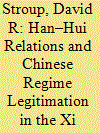

|
|
|
|
|
| Summary/Abstract |
The Chinese Communist Party stresses the regime’s role in presiding over the unity of China’s minzu (ethnic groups) and their shared stake in China’s prosperity. However, an examination of the quality of interactions between Han and ethnic minorities illustrates the regime’s vulnerability to counterclaims based on these lived experiences. This paper conducts a case study of Han–Hui relations to argue that physical separation between Han and Hui prevents the two groups from interacting in ways that transmit substantive knowledge about the differences between the groups. Instead, interactions perpetuate stereotypes and distrust. By continuing to push narratives about the unity of all groups and shared family relations, the state highlights the shortcomings of its own policies, and undercuts its own legitimating narrative.
|
|
|
|
|
|
|
|
|
|
|
|
|
|
|
|
| 3 |
ID:
132712
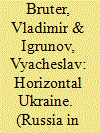

|
|
|
|
|
| Publication |
2014.
|
| Summary/Abstract |
The participation of Donetsk representatives in the government corresponds to the "horizontal principle," but domination does not. There will be neither real reform nor a modern and efficient state in Ukraine unless regions feel that they are equal.
|
|
|
|
|
|
|
|
|
|
|
|
|
|
|
|
| 4 |
ID:
183137


|
|
|
|
|
| Summary/Abstract |
The consciousness of non-Han nationalities in modern China evolved around a deep antipathy to the Qing, assimilationist ideas, and pretentious multi-ethnicism. The concepts of equality among nationalities and right to self-determination entered into the discourse of nation- and state-building in China under the influence of Lenin’s revolutionary ideals and Stalin’s views on ‘the national question’. The Communist Party of China (CPC) has struggled to reconcile these concepts with its nationalist agenda since its inception in 1921. The CPC later innovated ethno-regional autonomy for minorities and developed corresponding institutions. This article argues that the Party’s three main agendas of national unification and interethnic unity, developmental goals, and majoritarian nationalism have all complicated its ties with ethnic minorities, and evaluates how the present leadership of the 100-year-old Party has been managing the relationship.
|
|
|
|
|
|
|
|
|
|
|
|
|
|
|
|
| 5 |
ID:
157958
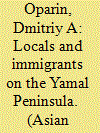

|
|
|
|
|
| Summary/Abstract |
Western Siberia and the entire Arctic region have been a beacon for migrants from the European part of Russia, from the national republics and the southern regions of Siberia in the post-war era. In contrast with the other regions of Siberia, the oil- and gas-rich North remains a magnet for migration from the entire former Soviet Union to this day. This paper presents research into the contemporary sociocultural environment of Yar-Sale, the administrative centre of the Yamal district of Yamalo-Nenets Autonomous Okrug. The research focuses on the migrational experiences of ‘new’ migrants and their relations with the native Nenets population. Special attention is paid to concepts such as ‘local’/‘immigrant’, and ‘insider’/‘outsider’. The author holds that the boundaries between these categories are flexible. An immigrant may become a local and an insider may become an outsider, with ethnicity far from always being the deciding factor.
|
|
|
|
|
|
|
|
|
|
|
|
|
|
|
|
| 6 |
ID:
140442
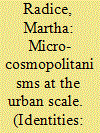

|
|
|
|
|
| Summary/Abstract |
Scholars may no longer see cosmopolitanism as the preserve of the jet-setting elite, but they still tend to focus on international travel as the primary means of acquiring cosmopolitan competence. However, one should not confuse mindsets with mileage: if travel does not always generate cosmopolitanism, then neither is it a precondition for it, so stay-at-homes can become cosmopolitan too. This article draws on ethnographic fieldwork in multiethnic neighbourhoods of Montréal, Quebec, to show how cosmopolitanism can be produced and practised within the microcosm of the city. While international mobility is not necessarily part of these negotiations of difference, other kinds of spatial and social mobility are, especially intra-urban mobility and mobility of the imagination. Examining micro-cosmopolitanism at the urban scale, however, also reveals that practices of and aspirations towards cosmopolitanism do not necessarily coincide.
|
|
|
|
|
|
|
|
|
|
|
|
|
|
|
|
| 7 |
ID:
124357


|
|
|
|
|
| Publication |
2012.
|
| Summary/Abstract |
One of the major problems facing both analysts and ideologues of nationalism is the paradoxical use of the term. On the one hand, nationalism is an odious and marginal phenomenon, not to mention a synonym for social deviation. A passage from Vladimir Putin's campaign platform "The 2012-2018 Program" provides a vivid example of this: "We will fight any attempts to use information space for the propaganda of cruelty, nationalism, pornography, drug abuse, smoking, and alcoholism." Many prime examples of political propaganda pale in the face of this refined logical order.
|
|
|
|
|
|
|
|
|
|
|
|
|
|
|
|
| 8 |
ID:
127427
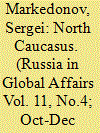

|
|
|
|
|
| Publication |
2013.
|
| Summary/Abstract |
While previously developments in the North Caucasus were primarily looked at from the viewpoint of inter-ethnic relations and regional policies, today this theme has expanded to a pan-Russian scale. It is not Chechnya, Ingushetia, or Dagestan per se that matter; rather, it is how the Russian heartland perceives those regions.
|
|
|
|
|
|
|
|
|
|
|
|
|
|
|
|
| 9 |
ID:
162777
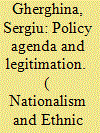

|
|
|
|
|
| Summary/Abstract |
The increasing use of referendums in contemporary societies raises several questions about their emergence. Among these, it is unclear why controversial and sensitive issues are subjected to popular vote. So far, limited research has investigated why referendums on interethnic relations are initiated. This article seeks to address this gap in the literature and analyzes these reasons by focusing on all five referendums called on interethnic relations in Central and Eastern Europe. These referendums are those organized in Estonia (1992), Latvia (1998 and 2012), Hungary (2004) and Slovenia (2004). The findings of our qualitative analysis reveal that the initiators were driven either by agenda-setting or policy legitimation incentives.
|
|
|
|
|
|
|
|
|
|
|
|
|
|
|
|
| 10 |
ID:
124359


|
|
|
|
|
| Publication |
2012.
|
| Summary/Abstract |
For Russian Muslims, foreign policy is the continuation of the home policy. As part of the global 1.5-billion-strong community, they identify themselves and their interests with what is happening to their coreligionists abroad. However, in view of domestic peculiarities, it is mainly Muslim elites that are active in the international arena, whereas for the masses these problems are important largely due to religious principles, rather than calibrated political interests.
|
|
|
|
|
|
|
|
|
|
|
|
|
|
|
|
| 11 |
ID:
127421


|
|
|
|
|
| Publication |
2013.
|
| Summary/Abstract |
The year 2013 is considered to be a year of Russia's foreign policy successes. A string of events - from the breakthrough in settling the chemical weapons issue in Syria and the hard line on the Snowden case to contribution to the settlement of the Iranian problem to the convincing explanation to Kiev as to why it should refrain from signing an association agreement with the EU - made the world speak of Moscow's potent capability to achieve its goals.
|
|
|
|
|
|
|
|
|
|
|
|
|
|
|
|
| 12 |
ID:
124393


|
|
|
|
|
| Publication |
2012.
|
| Summary/Abstract |
The summer of 2012 witnessed a flare up of hostilities in the remote Gorno-Badakhshan region in Tajikistan and government troops had to be sent in. This took place just weeks after Tajikistan had celebrated the fifteenth anniversary of the end of its civil war, a struggle that had almost destroyed the country. At the time, Tajikistan was in a fragile state, having just emerged as an independent country after the breakup of the Soviet Union. The peace agreement signed in Moscow in 1997 provided an opportunity to overcome inter-clan and religious rifts in Tajik society through gradual democratization. However, the country's leadership opted for a different sort of policy, and this is the root cause of the problems that we are seeing today. They will have to be addressed again at some point.
|
|
|
|
|
|
|
|
|
|
|
|
|
|
|
|
| 13 |
ID:
185930


|
|
|
|
|
| Summary/Abstract |
This paper discusses interethnic dynamics in a multi-ethnic Khmu and Akha village in the uplands of Phongsali Province, far-north Laos. It offers an intimate vignette on how local Khmu people’s patronizing disposition towards their Akha neighbors – and Sino-Tibetan highlanders more broadly – has been shaped by Laos’ recent history of war, revolution, and development. In particular, it shows how essentializing images of Akha as backward bumpkins in need of civilizing tutelage have provided local Khmu with a foil and platform for their pursuit of a culturally specific sense of modernity. In so doing, this paper refocuses the analysis of interethnic relations in Laos away from state-centered, lowland-upland, majority-minority frameworks, and towards localized, micro-regional and, most significantly, intra-upland dynamics. Concomitant to this refocus, this paper offers novel insights into the localized impact of Laos’ watershed civil war and its lingering aftermath. It also speaks to broader issues, including the applicability of the scholarly trope of “internal Orientalism” across scales, as well as the ethics and politics of researching inter-ethnic relations in a society still marked by the trauma of war.
|
|
|
|
|
|
|
|
|
|
|
|
|
|
|
|
| 14 |
ID:
127426


|
|
|
|
|
| Publication |
2013.
|
| Summary/Abstract |
Some political scientists believe there is no common nation in Russia, precisely because of ethnic and cultural diversity. Those who deny the existence of identity in Russia point to the absence of civil society and democratic institutions and, consequently, of a civic nation.
|
|
|
|
|
|
|
|
|
|
|
|
|
|
|
|
|
|
|
|
|